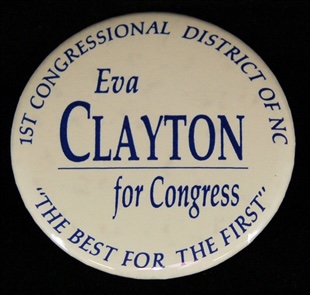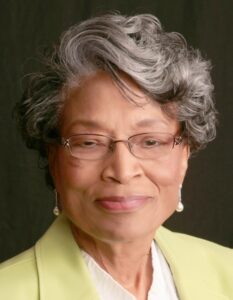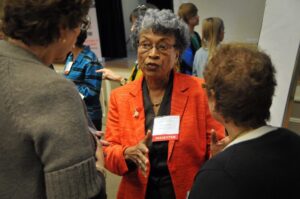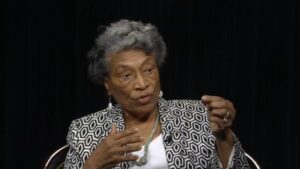By Dr. Joy Martinez, Staff Writer
In 1992, Democrat Eva McPherson Clayton made history when she became the first Black woman in North Carolina to serve in the U.S. House of Representatives. But that was not the only time the tenacious woman made history. In 1970, she became the first director of N.C. Health Careers Access Program and when elected to Warren County Board of Commissioners 1980, she became the first woman to serve as Chair. In 1993, Eva Clayton’s Congressional Democratic colleagues elected her the first woman president of the freshman class.
In the years leading up to the election, she sat for an interview for “Documenting the American South.” She left no question regarding her resilience and insistence that she and other women be respected for their achievements. The interviewer asked Eva Clayton about her appointment in 1977 as Assistant Secretary for Community Development for the North Carolina State Department of Natural Resources and Community Development. She was the first Black female to hold the position. But being first was not her goal.
“That’s no longer important to me, to be the first. It’s factual; I was the first Black female that ever was Assistant Secretary in a Department of North Carolina. But, to have that distinction is acknowledge, but to contribute to certain conditions that were unacceptable to me as a person, I’m a person before I’m an official. I live with my dignity, so it was an opportunity to keep all of that in contact and still make a contribution.”
She is still contributing.
Born in Savannah, Georgia, on September 16, 1934, Clayton grew up in Augusta, Georgia and earned her Bachelor of Science degree in Biology from Johnson C. Smith University in 1955. In 1962 she earned an Master of Science degree in Biology and General Science from North Carolina Central University in Durham. She originally planned to become a doctor and travel to Africa to do missionary work.
She explains, “I held on to my goal of going to medical school after my husband graduated from law school and the birth of our two children. I earned a graduate degree in biology with the idea this would help [with] my acceptance into medical school. Although I never applied to medical school, the same driving force of wanting to serve and make a difference inspired me to seek other opportunities.” With her husband and prominent attorney, Theaoseus Clayton, she raised four children: Theaoseus Jr., Martin, Reuben, and Joanne. After the birth of her fourth child, Clayton reluctantly withdrew from law school.
Law, policy and civil rights define this history maker. Clayton worked with civil-rights activist Floyd McKissick at Soul City, in charge of creating all the social services the new city would provide: healthcare, education, recreation, and spiritual life. President Richard Nixon approved a $14 million federal grant in 1972 to build a town organized by Black businesses in Warren County. Although Soul City still exists, the project never got off the ground during a difficult economic period and in the face of strong opposition from some North Carolina political leaders.

Clayton explained the challenge, “We’d have to train people if they were to work there.” Blacks in Warren County were generations of farmers, putting them at a disadvantage even for “unskilled” manufacturing jobs that were planned in the community. Clayton has frequently pointed out that fundamental services like healthcare and schools would be top priorities for any prospective employer. These were areas that the Soul City Foundation was focusing on by the mid-1970s. They opened a Head Start and a daycare in 1974 and, soon after, Healthco, a health clinic. But Clayton admitted that Soul City foundation’s mission was highly ambitious and an idea “before its time. We must have looked at the potential that nonprofits could do and thought, do we want to do all that? Of course we want to do all that. Why wouldn’t we want to do that? We want to build the best community we can.”
After leaving state government in 1981, she founded an economic development consulting firm. In 1982 she won election to the Warren County board of commissioners, which she chaired until 1990. Over the next decade, Clayton helped steer more than $550 million in investments into the county and also successfully passed a bond issue for the construction of new schools.
On November 3, 1992, she won the special election to fill the last two months of Walter Jones Sr.’s unexpired term in the 102nd Congress (1991–1993) and defeated Republican Ted Tyler for a full term in the 103rd Congress (1993–1995). In her subsequent five bids for re-election, the Congresswoman won comfortably, with 60 percent or more of the vote. After leaving Congress in 2003, she accepted the Assistant Director General position in Rome with the Food and Agriculture Organization of the United Nations for three years. She organized 24 national partnerships and alliances worldwide to fight hunger and poverty.

When asked about her election Clayton is clear, “I ran as an individual, a Black woman who believed in herself, with faith in God and a desire to make a difference in her community. I said at my election, “I too sing America.” But the story she tells envelopes the women that stood as examples and supporters for her.
The 2018 wave of female candidates captured America’s attention, but it’s the second election year to earn the sobriquet. The first was in 1992 when 28 women were elected to Congress, nearly doubling the number of women in the House of Representatives and bringing the total of female senators from two to six. That first “Year of the Woman” wave was triggered, for many of the 1992 candidates, by a single, indelible event: Anita Hill’s 1991 appearance at the confirmation hearing of then-Supreme Court nominee Clarence Thomas.
They thought a man was going to represent the district. Well, Eva Clayton represented the district.”
“With Anita Hill being a woman and Black, it inspired me that I too could do it. The possibility Anita Hill gave to me this as a candidate–I ran in a field of five men. There were six good candidates, but I happened to be the best. Anita Hill affected a lot of people, and she certainly motivated me to be an even stronger candidate. I knew I was running in an all men’s sport–there wasn’t no doubt about that. They thought a man was going to represent the district. Well, Eva Clayton represented the district.”


